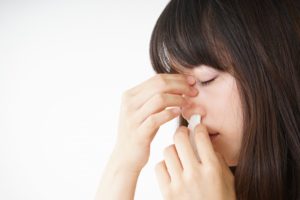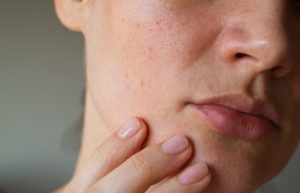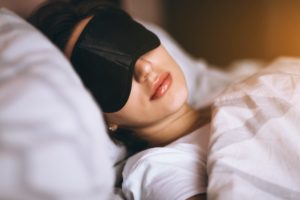When you buy through our links, we may earn a commission. Products or services may be offered by an affiliated entity. Learn more.
Nicotine and Sleep
Nicotine is an addictive chemical contained in vapes, cigarettes, and other tobacco products. Once ingested, nicotine can reach the brain within seconds, triggering a cascade of changes in the body that affect heart rate, mood, and digestion. Nicotine can also make it harder to get the quality sleep you need.
How Nicotine Affects Your Sleep
Whether from tobacco products or vapes, even occasional use of nicotine can negatively affect sleep. In fact, studies suggest that smokers are almost 50% more likely to experience sleep troubles than non-smokers. People who smoke, vape, or use other tobacco products tend to take longer to fall asleep, wake up more often during the night, and sleep fewer hours.
Using nicotine can also change how the body moves through the stages of sleep. Tobacco users tend to spend longer in the lighter stages of sleep, leading to more nighttime awakenings, and less time in the deep and restorative stage of sleep.
Tobacco and other nicotine products have been found to increase the risk of several sleep problems, including snoring and sleep disorders like obstructive sleep apnea and certain parasomnias.
Looking to improve your sleep? Try upgrading your mattress.
Does Nicotine Keep You Awake?
Nicotine is a stimulant and works quickly in the body, causing a rapid release of hormones that increase a person’s breathing, blood pressure, and heart rate.
People who smoke or use nicotine products often report experiencing difficulty falling asleep, waking up frequently throughout the night, and experiencing overall poorer sleep quality compared to non-smokers. It is important to avoid all nicotine products at least four hours before bed to promote better sleep quantity and quality.
“Nicotine and sleep just don’t go well together. Studies show that nicotine worsens your sleep in multiple ways. Quitting is difficult, but there are strategies to help you, and within a short period, it definitely improves your sleep, in addition to many other health benefits.”
Dr. Pranshu Adavadkar, Sleep Physician
Does Nicotine Make You Tired?
Tiredness is a common symptom of nicotine withdrawal. Withdrawal occurs when the level of nicotine in the blood goes down, triggering uncomfortable symptoms as the body begins to seek out more of the drug. Other symptoms of nicotine withdrawal include:
- Cravings
- Anxiety
- Depression
- Nightmares
- Headaches
- Irritability
- Difficulty concentrating
- Hunger
Fortunately, the symptoms of nicotine withdrawal are temporary. The worst symptoms generally occur around two to three days after quitting. Daytime tiredness tends to slowly get better during thefirst 20 days after quitting.
Can Nicotine Replacement Therapy Affect Sleep?
Nicotine replacement therapyis a type of treatment used to help people quit smoking and vaping. By providing the body with a small amount of nicotine, research shows that products like nicotine gum, patches, and lozenges can reduce the symptoms of nicotine withdrawal.
Some people have trouble sleeping within the first several days after starting nicotine replacement therapy, especially when using the nicotine patch.
While they may temporarily make it more difficult to sleep, experts emphasize that the benefits of using nicotine replacement therapy far outweigh the risks of continuing to smoke or vape. Additionally, trouble sleeping while using nicotine replacement therapy typically goes away over time.
How to Improve Sleep While Quitting Smoking
Although coping with symptoms of nicotine withdrawal can be a challenge, several evidence-based tips can help people get better sleep when quitting smoking.
- Exercise: Getting enough physical activity during the day can help combat cravings and make it easier to fall asleep at night during nicotine withdrawal.
- Reduce caffeine: Quitting smoking can affect how the body metabolizes caffeine, increasing the time that caffeine stays in the body. To lessen the impact of caffeine on sleep, be sure to stop drinking coffee and other caffeinated beverages at least 8 hours before sleep.
- Stop nicotine replacement therapy before bed: Using nicotine replacement therapy increases a person’s chances of quitting. If nicotine replacement therapy causes sleep issues, experts suggest removing the patch and stopping other nicotine products around an hour before bedtime. It can also be helpful to talk to a doctor about changing the dosage of nicotine replacement therapy.

Still have questions? Ask our community!
Join our Sleep Care Community — a trusted hub of sleep health professionals, product specialists, and people just like you. Whether you need expert sleep advice for your insomnia or you’re searching for the perfect mattress, we’ve got you covered. Get personalized guidance from the experts who know sleep best.
References
5 Sources
-
Jaehne, A., Loessl, B., Bárkai, Z., Riemann, D., & Hornyak, M. (2009). Effects of nicotine on sleep during consumption, withdrawal and replacement therapy. Sleep Medicine Reviews, 13(5), 363–377.
https://pubmed.ncbi.nlm.nih.gov/19345124/ -
Spadola, C. E., Guo, N., Johnson, D. A., Sofer, T., Bertisch, S. M., Jackson, C. L., Rueschman, M., Mittleman, M. A., Wilson, J. G., & Redline, S. (2019). Evening intake of alcohol, caffeine, and nicotine: night-to-night associations with sleep duration and continuity among African Americans in the Jackson Heart Sleep Study. Sleep, 42(11), zsz136.
https://pubmed.ncbi.nlm.nih.gov/31386152/ -
U.S. Department of Veterans Affairs. Sleep & Tobacco Use. Mental health., Retrieved September 30, 2023, from
https://www.mentalhealth.va.gov/quit-tobacco/docs/VAM_TH-094_Sleep_and_Tobacco_Use_One_Pager_508.pdf -
A.D.A.M. Medical Encyclopedia. (2022, July 25). Nicotine and tobacco. MedlinePlus., Retrieved September 30, 2023, from
https://medlineplus.gov/ency/article/000953.htm -
A.D.A.M. Medical Encyclopedia. (2023, February 28). Nicotine replacement therapy. MedlinePlus., Retrieved September 30, 2023, from
https://medlineplus.gov/ency/article/007438.htm
































































